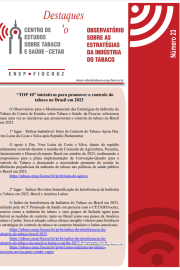
The Observatory for Monitoring Tobacco Industry Strategies of the Center for Tobacco and Health Studies, at Fiocruz, once again selected the initiatives that promoted tobacco control in Brazil in 2023.
KORNALEWSKI, Alex Medeiros; CARVALHO, Alexandre Octavio Ribeiro de; BARATA, Danielle; HASSELMANN, Luis Guilherme; TURCI, Silvana Rubano. Destaques do Observatório sobre as Estratégias da Indústria do Tabaco. Cetab/Ensp/Fiocruz, Rio de Janeiro, jan. 2024. Acesso em: 29 jan. 2024.
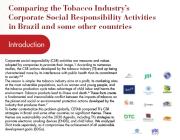
Corporate social responsibility actions (CSR) are measures and values adopted by companies to enhance their image in society. According to numerous studies, when developed by the tobacco industry (IT), these actions end up being characterized more by their interference in public health than by their commitment to society.
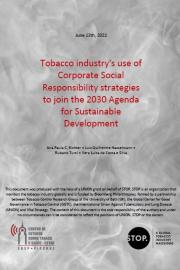
This document consists of an analysis of publications on Agenda 2030 and IT CSR actions available for academic research (abstract, report, file, scientific article, review, monograph, etc.), available in traditional media (radio, television, newspapers, pamphlets , etc) and available on digital media (social networks, blogs, YouTube channels, e-mail, among others), in the period between 2012 and 2021. For the search, the following descriptors were used: (SDG) OR (ODS) OR (Agenda for sustainable development) OR (2030 Agenda) OR (Sustainable Development Goals) OR (Agenda for Sustainable Development) OR (sustainable development) AND (tobacco industry) OR (tobacco industry)) AND (corporate social responsibility) OR (social corporate responsibility) AND (Brazil) OR (Brazil).
RICHTER, Ana Paula; HASSELMANN, Luis Guilherme Hasselmann; TORRES, Raquel; TURCI, Silvana Rubano; SILVA, Vera Luiza da Costa e. Uso pela indústria do tabaco de estratégias de Responsabilidade Social Corporativa para se associar à Agenda 2030 para o Desenvolvimento Sustentável [projeto STOP]. Centro de Estudos sobre Tabaco e Saúde (Cetab), Rio de Janeiro, 13 jun. 2022. 44p.
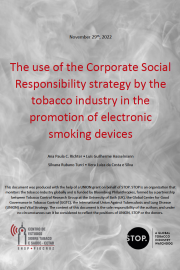
Changes related to the interference of interested sectors and the role of the State in the economy and society are a phenomenon that has been happening worldwide in recent decades and has consequently generated discussions about the role of private organizations in public health issues (Serpa & Fourneau, 2007). A growing number of companies worldwide have been striving to incorporate corporate social responsibility (CSR) as an integral part of their business. Currently, there is no consensus on the definition of the term CSR. However, authors such as Harjoto & Jo (2011) and Cai and colleagues (2011) suggest that the definitions of CSR refer to the efforts of companies to serve the society and the environment beyond what is required of them.
RICHTER, Ana Paula; HASSELMANN, Luis Guilherme Hasselmann; TORRES, Raquel; TURCI, Silvana Rubano; SILVA, Vera Luiza da Costa e.O uso da estratégia de Responsabilidade Social Corporativa (RSC) pela indústria do tabaco na promoção dos Dispositivos eletrônicos de fumar (DEFs) [projeto STOP]. Centro de Estudos sobre Tabaco e Saúde (Cetab), Rio de Janeiro, 23 mai. 2022. 61p.
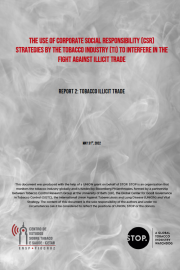
The illicit trade in tobacco products represents a major global concern for public health, economy and public safety. More specifically, the illicit trade in tobacco products undermines tobacco control policy efforts, particularly in relation to tax policy. As they are not taxed or regulated, illicit tobacco products do not have health warnings or packaging or labeling requirements, which favors their consumption. As with other regions in the world, the illegal cigarette trade in Mercosur involves lower average prices compared to taxed cigarettes. Furthermore, the increase in the accessibility of cigarettes, via the informal market, combined with the lower prices of smuggled products - and therefore not subject to regulation - favors the consumption of cigarettes by young people and low-income populations 1,4.
HASSELMANN, Luis Guilherme Hasselmann; RICHTER, Ana Paula Cardoso; TURCI, Silvana Rubano; SILVA, Vera Luiza da Costa. Uso pela indústria do tabaco (IT) de estratégias de Responsabilidade Social Corporativa (RSC) para interferir no combate ao comércio ilícito [projeto STOP]. Centro de Estudos sobre Tabaco e Saúde (Cetab), Rio de Janeiro, 23 mai. 2022. 49p.
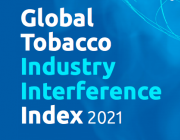
Enquanto os governos têm o poder de restringir regulamentos da indústria, infelizmente, o oposto parece ter acontecido nestes tempos difíceis. No muitos países, os governos têm protegido e até promoveu a TI. O tabaco já é o responsável por cerca de 8 milhões de mortes anuais em todo o mundo1 e saúde e as perdas de produtividade custam cerca de US $ 1,4 trilhão todos os anos. No entanto, os governos foram persuadidos a acomodar as demandas e lobby deste prejudicial indústria e aceitar sua caridade, conforme mostrado no Global Índice de Interferência da Indústria do Tabaco 2021 (o Índice).
GLOBAL Tobacco Industry Interference Index 2021. Global Center for Good Governance in Tobacco Control, Thialand, 2021, nov. 2021. 72p.
Objetivo 3. Assegurar uma vida saudável e promover o bem-estar para todas e todos, em todas as idades
3.1 Até 2030, reduzir a taxa de mortalidade materna global para menos de 70 mortes por 100.000 nascidos vivos
3.2 Até 2030, acabar com as mortes evitáveis de recém-nascidos e crianças menores de 5 anos, com todos os países objetivando reduzir a mortalidade neonatal para pelo menos 12 por 1.000 nascidos vivos e a mortalidade de crianças menores de 5 anos para pelo menos 25 por 1.000 nascidos vivos
OBJETIVO de Desenvolvimento Sustentável. ONU, Estados Unidos, 23 jul 2021. Disponível em: https://brasil.un.org/pt-br/sdgs/3. Acesso em: 24 jun 2024.
Fortalecer a implementação da Convenção-Quadro para o Controle do Tabaco em todos os países
Os Objetivos de Desenvolvimento Sustentável são um apelo global à ação para acabar com a pobreza, proteger o meio ambiente e o clima e garantir que as pessoas, em todos os lugares, possam desfrutar de paz e de prosperidade. Estes são os objetivos para os quais as Nações Unidas estão contribuindo a fim de que possamos atingir a Agenda 2030 no Brasil.
COMBATE ao tabagismo, um dos objetivos de Desenvolvimento Sustentável 3. AMB, São Paulo, 23 jul 2021. Disponível em: https://amb.org.br/tabagismo/combate-ao-tabagismo-um-dos-objetivos-de-de.... Acesso em: 24 jun 2024.
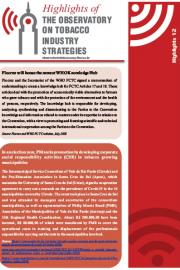
fact sheets with the topics considered outstanding in order to promote debates and decision making in the scope of tobacco control. In this edition, the following points are presented: Fiocruz will house the newest WHO knowledge center; in an election year, Philip Morris aims to promote corporate social responsibility (CSR) actions in tobacco producing municipalities; partnerships with the tobacco industry conflict with public health interests; good news: Marvel and Netflix pledge to decrease cigarette display.
KORNALEWSKI, Alex Medeiros; CARVALHO, Daniel da Costa e Silva de; BARATA, Danielle; LEONEL, Filipe; TURCI, Silvana Rubano. Destaques do Observatório sobre as Estratégias da Indústria do Tabaco. Cetab/Ensp/Fiocruz, Rio de Janeiro, mai. 2017. Acesso em: 13 jul. 2017.